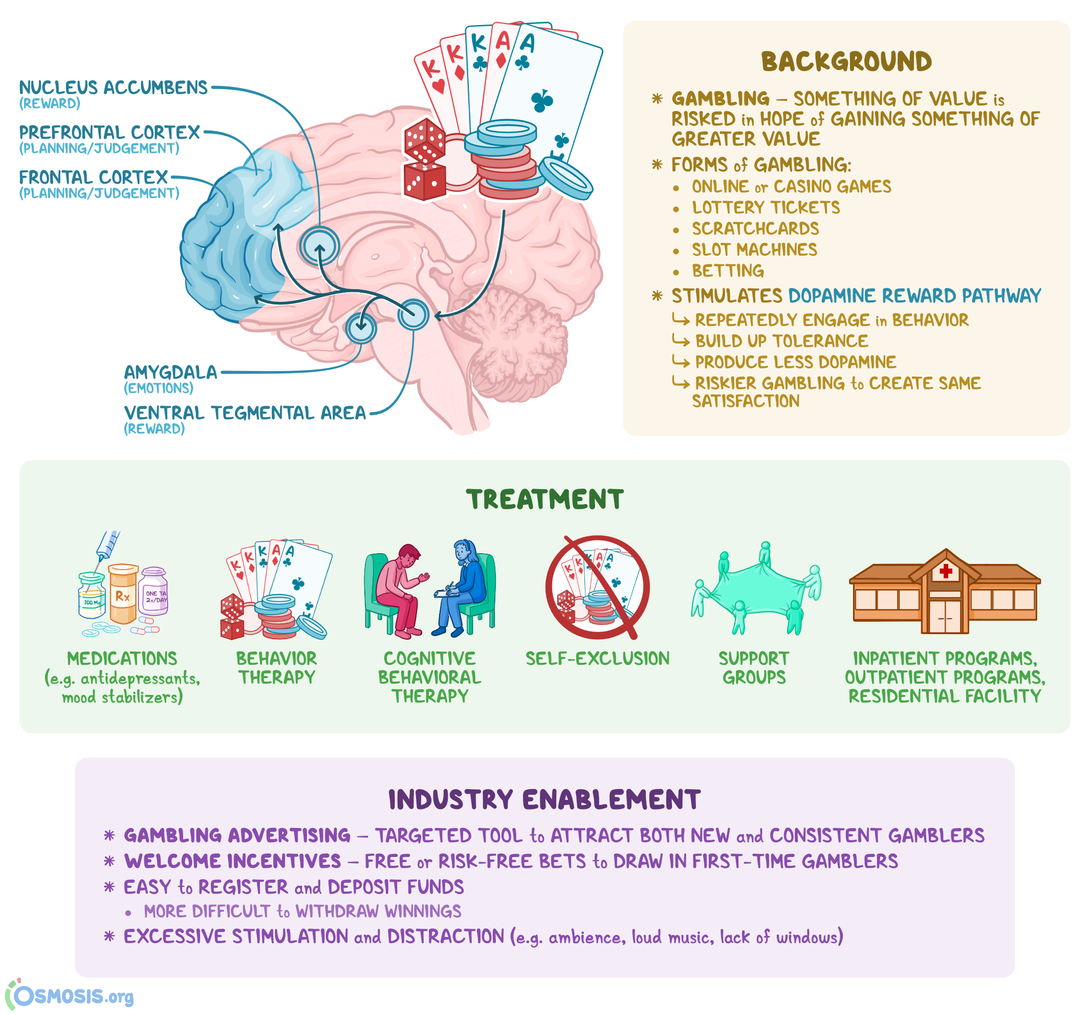The focus keyword: “How can medication be used to treat gambling addiction?”
Hey there! Welcome to the world of addiction treatment and recovery. Today, we’re going to explore an interesting question: how can medication be used to treat gambling addiction? If you or someone you know is struggling with this issue, stick around because we’ve got some valuable insights to share.
Gambling addiction is a serious problem that can have a significant impact on a person’s life. But the good news is that there are various approaches to treatment, and medication is one of them. In this article, we’ll delve into the different ways medication can be used to help individuals overcome their gambling addiction.
So, if you’re curious about how medication can be a valuable tool in the battle against gambling addiction, keep reading! We’ll discuss the role of medication in the treatment process, its effectiveness, and the types of medications commonly used. Don’t worry, we’ll break it down into easy-to-understand terms, so everyone can follow along. Let’s get started!
– Antidepressants can help with underlying depression or anxiety.
– Mood stabilizers can regulate mood swings and impulsive behavior.
– Medications used for substance abuse may also be prescribed.
Consult with a healthcare professional to determine the most appropriate medication options for your specific situation.

How can medication be used to treat gambling addiction?
Gambling addiction is a serious issue that affects millions of people worldwide. While therapy and support groups have traditionally been the primary methods of treatment, medication is increasingly being recognized as a valuable tool in helping individuals overcome their addiction. In this article, we will explore the different medications available for gambling addiction and how they can be used in conjunction with other treatments to provide effective and long-lasting relief.
Understanding Gambling Addiction
Gambling addiction, also known as compulsive gambling or pathological gambling, is a condition characterized by a continuous and uncontrollable urge to gamble, despite negative consequences. It is classified as an impulse control disorder and is often associated with other mental health conditions such as depression and anxiety. The dopamine rush experienced during gambling acts as a reinforcement mechanism, making it difficult for individuals to quit on their own.
Medications for Gambling Addiction
In recent years, several medications have shown promising results in assisting individuals with gambling addiction. These medications primarily target the brain’s reward system and aim to reduce cravings and impulsive behavior. One such medication is Naltrexone, an opioid antagonist that blocks the effects of opioids and dopamine in the brain. Studies have shown that Naltrexone can effectively reduce gambling urges and improve impulse control.
Another medication commonly used for gambling addiction is Selective Serotonin Reuptake Inhibitors (SSRIs) such as Fluvoxamine. SSRIs are typically used as antidepressants but have also been found to be effective in treating impulse control disorders. These medications work by increasing serotonin levels in the brain, which helps regulate mood and reduce impulsive behavior.
It is important to note that medication alone is not a cure for gambling addiction. It should be used as part of a comprehensive treatment plan that includes therapy, support groups, and lifestyle modifications. The goal of medication in the treatment of gambling addiction is to help individuals regain control over their impulses and reduce the urge to gamble.
Benefits of Medication for Gambling Addiction
Medication can offer several benefits to individuals struggling with gambling addiction. Firstly, it can help reduce the intensity and frequency of gambling urges, making it easier for individuals to resist the temptation to gamble. This can significantly increase the chances of successful recovery and prevent relapses.
Furthermore, medication can also address underlying mental health conditions such as depression and anxiety, which are often co-occurring with gambling addiction. By treating these conditions, individuals may experience improved overall well-being and a reduced desire to engage in self-destructive behaviors like gambling.
Lastly, having the option of medication can provide individuals with a sense of hope and empowerment. It reinforces the idea that there are effective tools available to assist them in their journey towards recovery, increasing motivation and confidence.
Risks and Considerations
While medication can be beneficial in the treatment of gambling addiction, it is essential to consider the potential risks and side effects. Each medication comes with its own set of potential adverse effects, and it is crucial to discuss these risks with a qualified healthcare professional before starting any medication regimen.
Additionally, medication should always be used in combination with other forms of therapy and support. It is not a standalone treatment but rather a complementary tool that can enhance the effectiveness of other interventions.
Moreover, it is important to remember that medication is not a quick fix for gambling addiction. Recovery takes time and effort, and medication should be viewed as a part of the overall treatment plan rather than the sole solution.
Key Takeaways: How can medication be used to treat gambling addiction?
- Medication can help alleviate some of the symptoms associated with gambling addiction.
- Antidepressants may be prescribed to address underlying mental health issues.
- Anti-addiction medications can help reduce cravings and impulsive behavior.
- Medication should be used in conjunction with therapy and support groups for best results.
- It is important to consult with a healthcare professional to determine the most appropriate medication and dosage.
Frequently Asked Questions
Medication can be a valuable tool in treating gambling addiction. It can help control impulsive behavior, reduce cravings, and address underlying mental health issues linked to addiction. If you have questions about how medication can be used to treat gambling addiction, we have answers.
1. Are there specific medications designed to treat gambling addiction?
While there are no medications specifically approved for gambling addiction, certain drugs have shown promise in reducing addictive behaviors. Medications like selective serotonin reuptake inhibitors (SSRIs), such as fluoxetine, may help manage underlying anxiety and depression that often co-occur with gambling addiction. Naltrexone, typically used for alcohol and opioid addiction, has also been explored for its potential in reducing cravings and impulsivity in gambling addicts. It’s important to note that medication alone is not sufficient for treating gambling addiction, and it should be used as part of a comprehensive treatment plan.
2. How do medications help control impulsive behavior related to gambling?
Gambling addiction is characterized by impulsive behavior and a lack of self-control. Medications that target the brain’s reward system can help regulate impulsive behavior. For example, SSRIs can increase serotonin levels in the brain, which is associated with improving mood and reducing impulsivity. Naltrexone, on the other hand, works by blocking the brain’s opioid receptors, which can reduce the rewarding effects of gambling activities. By improving impulse control, medications can help individuals make more rational decisions and resist the urge to gamble.
3. Can medication help reduce cravings for gambling?
Yes, medication can play a role in reducing cravings for gambling. Naltrexone, for instance, has been found to reduce the intensity of cravings associated with gambling addiction. By blocking the opioid receptors in the brain, naltrexone can weaken the urge to gamble and make the addictive behavior less rewarding. However, it’s important to remember that medication is not a magic cure; it should be combined with therapy, support groups, and other forms of treatment for the best results.
4. Can medication help address underlying mental health issues linked to gambling addiction?
Yes, medication can help address underlying mental health issues that often co-occur with gambling addiction. Many individuals with gambling addiction also struggle with anxiety, depression, or other psychiatric disorders. Medications like SSRIs can be beneficial in managing these co-occurring conditions by regulating neurotransmitters in the brain. By treating both the gambling addiction and the underlying mental health issues simultaneously, individuals have a better chance at long-term recovery.
5. Are there any potential side effects of using medication to treat gambling addiction?
Like any medication, those used to treat gambling addiction can have potential side effects. Common side effects of SSRIs may include nausea, dizziness, and changes in appetite or sleep patterns. Naltrexone can cause nausea, headache, and fatigue. It’s essential to work closely with a healthcare provider who specializes in addiction medicine to monitor and manage any potential side effects. Remember, medication should always be part of a comprehensive treatment plan that includes therapy, support, and lifestyle changes.
Can gambling addictions be treated with medication?
Summary
Medication can be helpful in treating gambling addiction by targeting the brain’s chemistry. Some medications, like selective serotonin reuptake inhibitors (SSRIs), can reduce the urges to gamble. Other medications, such as opioid antagonists, can block the rewarding effects of gambling and help prevent relapse. However, medication should be used in conjunction with therapy and other support systems for the best outcomes. It’s important to consult a healthcare professional for guidance on the appropriate medication and dosage for gambling addiction treatment.
Overall, medication can be a useful tool in the treatment of gambling addiction, but it’s not a standalone solution. It’s crucial to also address underlying psychological and emotional factors, as well as seek support from therapists, support groups, and loved ones. With a comprehensive approach, individuals struggling with gambling addiction can find the help they need to overcome the challenges and improve their quality of life.
